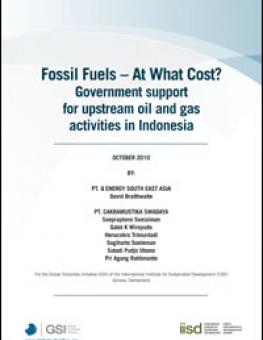
Fossil Fuels - At What Cost? Government support for upstream oil and gas activities in Indonesia
The GSI estimates that, globally, subsidies provided to the producers of fossil fuels—oil, gas and coal—could total as much as US$100 billion per year, but nobody knows the real figure as there is no international framework for regularly monitoring and reporting fossil-fuel subsidies.
Fossil-fuel producers can benefit from many different types of subsidies, including tax breaks, discounted royalty payments, low-interest loans and access to precious natural resources. Identifying these subsidies and quantifying their value requires in-depth studies of government accounts and the application of complex methodologies for calculating subsidy values. The GSI aims to forge a new global understanding about fossil-fuel subsidies by undertaking detailed country case studies to identify, quantify and assess subsidies provided to upstream oil, gas and coal activities.
The GSI's first report in this series, "Fossil Fuels - At What Cost?" studies the subsidies provided to fossil-fuel producers in Indonesia. The report details Indonesia's system of Production Sharing Contracts, providing new insights that have not been previously published, thanks to the research team's access to commerically-senstive documents. The study concludes that three subsidies can clearly be identified, totalling US$1.8 billion in 2008. The study estimates that this is a lower-bound figure, as at least seven other potential subsidies were identified that were unable to be assessed or quantified based on the available information.
The researchers recommend that further work could usefully undertake a full assessment of the economic, environmental and social impacts of these subsidies in order to further inform a public debate on whether the subsidies should be kept or considered for reform.
You might also be interested in
How Indonesia's Incoming President Can Advance the Transition to Clean Energy
With Prabowo Subianto inaugurated as Indonesia’s President, speculation abounds about the new administration’s commitment to the clean energy transition and climate targets, given Prabowo’s positioning as the “continuity candidate.” The question is, what, exactly, will be continued?
What the war in Ukraine means for Asia's climate goals
The queues outside petrol pumps in Sri Lanka have lessened, but not the anxiety. Asanka Sampath, a 43-year-old factory clerk, is forever vigilant. He checks his phone for messages, walks past the pump, and browses social media to see if fuel has arrived. Delays could mean being left stranded for days. "I am really fed up with this," he said. His frustrations echo that of the 22-million inhabitants of the island nation, facing its worst ever economic crisis because of heavy debts, lost tourism revenue during the pandemic, and surging costs. The consequent political turmoil culminated with the formation of a new government, but recovery has been complicated by Russia's invasion of Ukraine, and the consequent upending of global energy markets.
Curbing fuel subsidies is only the first step out of energy crisis
Indonesia’s fuel subsidies have been a recurring problem for the country’s economy. For years, they have been weighing on the state budget, providing unjust support for fossil fuels and slowing the much-awaited clean energy transition. But skyrocketing global energy prices could require the country to allocate a colossal Rp 700 trillion (US$46.6 billion) for energy subsidies this year – more than four times the budgeted amount.
Switching Fossil Fuel Subsidies in Indonesia to Support a Green Recovery
This brief looks at how Indonesia can start actively promoting renewable energy by removing the existing hurdles to its deployment—such as unattractive renewable energy feed-in tariffs and land and infrastructures barriers—and switching public support from fossil fuels to renewables to meet the country’s clean energy targets.